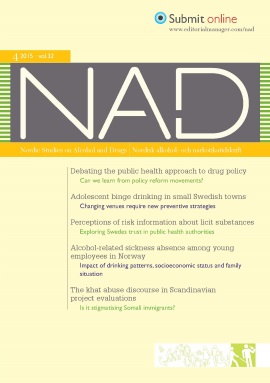NAD 4/2015 (September)

The compartmentalisation of social science: What are the implications?
In our editorial Matilda Hellman deliberates differences between basic and applied research. In the social sciences researchers have become specialised experts inhabiting narrow compartments of knowledge production. What does this mean for the future alcohol and drug research?
Four lessons from drug policy reform movements
<b>Ole Rogeberg</b> discusses how a public health approach sometimes fails to capture several concerns seen as important by recent drug policy reform movements, such as the full harms of illegal markets, the subjectively valued consumption of intoxicants, the dysfunctionality of current policy processes in the drug field and the value of the knowledge gained from policy experiments. Commentaries by Thomas Babor and Robin Room.
Targeting khat or targeting Somalis? A discourse analysis
In Scandinavia, the use of the psychoactive plant khat is widely seen as a social and health problem exclusively affecting the Somali immigrant population. Johan Nordgren has analysed the khat abuse discourse as it is presented in evaluation reports describing projects initiated by the social services to reduce khat abuse. According to Nordgren, overreliance on cultural explanations overlooks socioeconomic issues and that the focus should be on potentially problematic patterns of khat use rather than Somali immigrants in general.
The credibility of risk information about licit substances among Swedish adults
In this exploratory study, Mats Ekendahl and Patrik Karlsson analyse how Swedish adults trust and perceive risk information regarding alcohol, cigarettes and wet snuff (“snus”) provided by public authorities. The study suggests that attitudes on risk information are substance-specific and associated in complex ways with gender, age, education and experience of own substance use. The study indicates that the general population in Sweden receives what is seen as an adequate amount of knowledge from public authorities, and finds it consistent and trustworthy.
Alcohol-related sickness absence of young employees in Norway
Combining survey and register-based data, Line Schou and Gunn Birkelund have studied whether there are differences in alcohol-related sickness absence according to socioeconomic status and family situation among young employees in Norway. They have also assessed whether differences can be attributed mainly to differences. The authors found that alcohol-related sickness absence is more common among people who are single and without children, and more common among men than women. With the exception of income, socioeconomic factors do not seem to be important. The differences between groups appeared to be only partly a result of different drinking patterns.
Changing arenas of underage adolescent binge drinking in Swedish small towns
Using an ethnographic approach, Birgitta Ander and colleagues have explored arenas of adolescent binge drinking in small Swedish towns and the meanings these have for young persons. The focus of the article is on space and place, and on the geography of underage drinking. The authors found that adolescent binge drinkers have moved away from street and other outdoor drinking arenas to home environments, where they feel they have more control over their party location and participants.
Follow us on social media:


